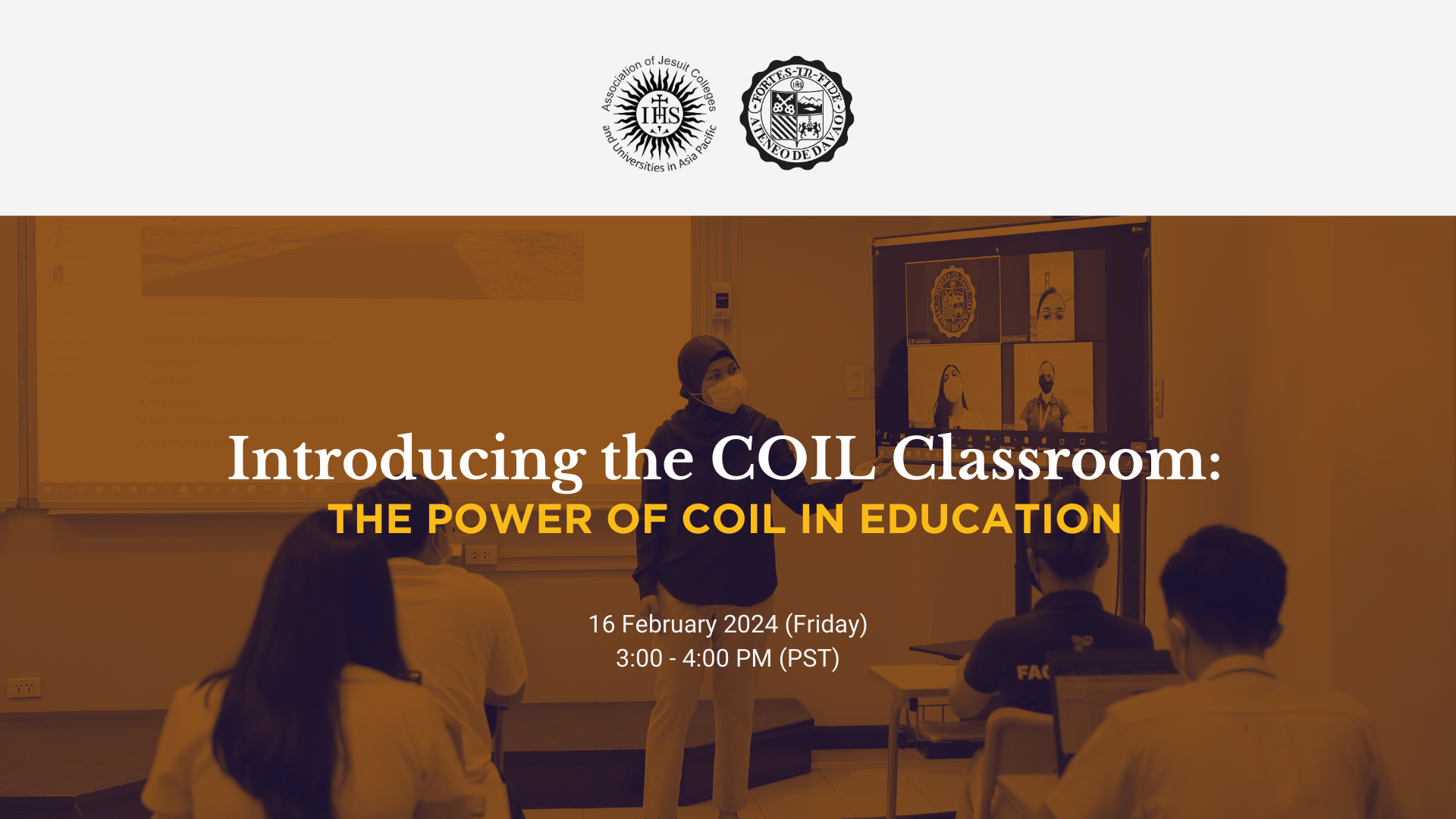The Ateneo de Davao University, in partnership with the Association of Jesuit Colleges and Universities in Asia Pacific (AJCU-AP) network, launched its Collaborative Online International Learning (COIL) Program. This endeavor commenced with an orientation session entitled “Introducing the COIL Classroom: The Power of COIL in Education” held on 16 February 2024 via Zoom video conference. The event attracted participants from institutions across the Asia Pacific region, each eager to explore the transformative potential of COIL in higher education.
The orientation served as a platform to orient professors and lecturers from partner institutions about the COIL initiative. It described the nature of the COIL Classroom, shedding light on its key aspects as a tool for virtual exchange. The event also marked the official launch of the Call for COIL Champions sign-up sheet, inviting educators to champion the cause of COIL implementation in the upcoming academic year.
Representatives from international institutions attended the orientation, promoting the widespread interest and commitment to cross-cultural collaboration from the AJCU-AP network and its partners. Among the ADDU attendees were delegates from Sanata Dharma University, Widya Mandala Catholic University Surabaya, Universitas Muhammadiyah Makassar, Catholic University of Pusan, Mae Fah Luang University, Ateneo de Naga University, and Xavier University – Ateneo de Cagayan, and many others. Disciplines ranging from the humanities and arts to sciences, mathematics, and engineering were well-represented, reflecting the interdisciplinary appeal of COIL.
Drawing from the wealth of expertise within the COIL community, the orientation featured speakers who shared invaluable insights and experiences. Dr. Wonkyung Rhee, Associate Professor at the Center for Global Education and Discovery at Sophia University, Japan, offered profound reflections on “COIL as a Powerful Tool in Education.” Dr. Rhee, commended for her contributions to international relations, Asian studies, and internet governance, provided participants with a deeper understanding of the transformative potential inherent in COIL.
Dr. Yu-Chih Doris Shih, Associate Professor at Fu Jen Catholic University, Taiwan, brilliantly led the group in “Exploring Cross-Cultural Collaboration: Lessons from COIL.” With her expertise in educational technology, multimedia education, and instructional design, Dr. Shih illuminated the nuances of cross-cultural collaboration in the context of COIL, drawing from her extensive research and teaching experience.
The event has officially launched the Call for AJCU-AP COIL Champions and hopefully brings together international spaces of teaching and learning within meaningful cross-cultural exchange.

What is COIL?
COIL, or Collaborative Online International Learning, is an approach to virtual exchange that interculturally and internationally links two classes from different institutions, usually in higher education.
It is a learning modality that, in the short-term, commonly unfolds across a 5- or 8-week period, within which a joint syllabus is co-designed and co-taught by a pair of partnered professors. Classes can be fully online or can be conducted in blended formats wherein the individual classes have face-to-face sessions in their respective campuses while being linked for COIL through an online feed that is supported by blended learning technology.
COIL culminates into an output that is collaboratively developed by the students and is demonstrative of their acquired knowledge from the COIL learning experience. COIL also encourages asynchronous meetings among students to further collaborate on their output as well as extend the intercultural exchange beyond the COIL classroom.
COIL can merge two classes from different disciplines and academic fields, or remain single-disciplinary. Either way, the nature of the collaboration would depend on the shared goal of the paired COIL professors.
Only rarely are completely new courses created at either of the collaborating higher education institutions. This is because COIL virtual exchange generally banks on grassroots partnerships from international linkages generated directly by the faculty members. Hence, COIL is typically embedded as a teaching modality within existing courses and is curricular in nature. The virtual exchange model, therefore, is revenue-neutral in that participating students are enrolled, charged tuition, and awarded grades only at their home institution. The same principle applies to faculty remuneration, ensuring neutrality in compensation processes across participating institutions.
Published on
